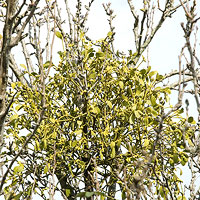
A-Z Indexes Food Health Guides
Health News |
MistletoeFind ProductsAlso indexed as:Viscum album  © Martin Wall © Martin WallBotanical names: Viscum albumParts Used & Where GrownMistletoe grows as a partial parasite on a variety of trees—particularly pine, apple, plum, poplar, and spruce—across northern Europe and Asia. The young leafy twigs with flowers are used. Mistletoe’s white berries are potentially toxic and should be avoided. American mistletoe, various species of Phoradendron, are similar but have not been widely studied. They should not be substituted for European mistletoe until more information is available.
Our proprietary “Star-Rating” system was developed to help you easily understand the amount of scientific support behind each supplement in relation to a specific health condition. While there is no way to predict whether a vitamin, mineral, or herb will successfully treat or prevent associated health conditions, our unique ratings tell you how well these supplements are understood by the medical community, and whether studies have found them to be effective for other people. For over a decade, our team has combed through thousands of research articles published in reputable journals. To help you make educated decisions, and to better understand controversial or confusing supplements, our medical experts have digested the science into these three easy-to-follow ratings. We hope this provides you with a helpful resource to make informed decisions towards your health and well-being. This supplement has been used in connection with the following health conditions:
Traditional Use (May Not Be Supported by Scientific Studies)The ancient Druids of northern Europe and other pagan groups revered mistletoe, particularly when it infected oak trees (a rare occurrence). Over time, this reverence of mistletoe was translated into the Christian ritual of hanging mistletoe over doorways at Christmas. The custom of kissing under the mistletoe may be a remnant of pagan orgies held before mistletoe altars.1 The name mistletoe is said to derive from the Celtic word for “all-heal.” This correlates with its historical use for everything from nervous complaints to bleeding to tumors.2 It is difficult to categorize all of the uses of mistletoe, particularly when one looks at the vast number of uses for this herb in traditional Chinese and Korean medicine. In the early 20th century, Rudolf Steiner created what is known as anthroposophical medicine. This mystical system used a variety of unusual remedies, including special extracts of mistletoe for injection. Steiner helped bring mistletoe into the modern era of scientific research, particularly as a potential treatment for cancer.3 Copyright © 2026 TraceGains, Inc. All rights reserved. Learn more about TraceGains, the company. The information presented by TraceGains is for informational purposes only. It is based on scientific studies (human, animal, or in vitro), clinical experience, or traditional usage as cited in each article. The results reported may not necessarily occur in all individuals. Self-treatment is not recommended for life-threatening conditions that require medical treatment under a doctor's care. For many of the conditions discussed, treatment with prescription or over the counter medication is also available. Consult your doctor, practitioner, and/or pharmacist for any health problem and before using any supplements or before making any changes in prescribed medications. Information expires December 2026. |
